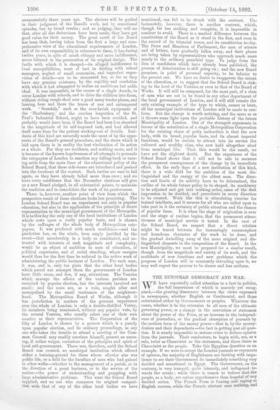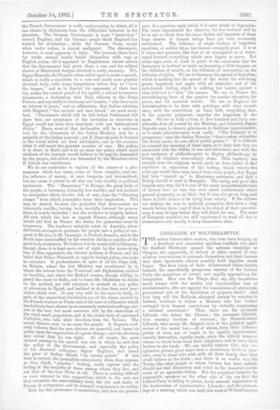THE EUROPEAN DEMOCRACY AND WAR.
WE have repeatedly called attention to a fact in politics, the full importance of which is scarcely yet recog- nised,—the growing dissonance between the views expressed in newspapers, whether English or Continental, and those entertained either by Governments or peoples. Whatever the cause, whether it be the extension to all men of the ultimate governing power, or a change in the conviction of statesmen about the power of the Press, or an increase in the independ- ence of journalists, or the gradual absorption of journals by the modern form of the money power—that is, by the money- dealers and their dependants—the fact is getting past all ques- tion. It is nearly impossible in serious crises to deduce opinion from the journals. Their conductors, to begin with, are, as a rule, twice as Chauvinist as 'the statesmen, and three times as Chauvinist as the people. Take this Egyptian Question as an example. If we were to accept the London journals as exponents of opinion, the majority of Englishmen are fretting with impa:- deuce to see their Government do immediately something very decided and sensational in Egypt. The Government, on the contrary, is very tranquil, quite leisurely, and indisposed to- wards the scenic ; while there is reason to believe that the people, as a body, are rather apprehensive than hopeful of any decided action. The French Press is fuming and raging at English success, while the French electors care nothing, and
the French Government is coolly endeavouring to obtain all it can obtain by diplomacy from the difficulties inherent in the situation. The German Government is most " benevolent " toward England, and the German people think England has worked for civilisation ; while the German Press, except when under orders, is almost malignant. The dissonance, however, is most apparent in Italy. The journals there have for weeks seemed nearly beside themselves with rage at English action, till it appeared to Englishmen almost certain that the Government had given them a cue, and the wildest stories of Ministerial designs obtained a ready currency. Yet, Signor Depretis, the Premier, when called upon to make a speech, which is really a manifesto to a new and much more popular electoral body, with many temptations before him to " wave the banner," and so to deprive his opponents of their best cry, makes the central points of his speech a refusal to increase armaments, a declaration that Italy adheres to the Great Powers, and especially to Germany and Austria, " who have such an interest in peace," and an affirmation that Italian relations with England, " her ancient and sure friend," are most excel- lent. " Documents which will be laid before Parliament will show that our acceptance of the invitation to intervene in Egypt would not have been consistent with our international duties." Every word of that declaration will be a welcome text for the adversaries of the Italian Ministry, and for a majority of the Italian journals ; yet S. Depretis puts it forward in the words which are least mistakable, and on the occasion when it will reach the greatest number of ears. His policy, it is clear, is fixed, and is in no sense the policy which mere students of the journals would believe to be eagerly demanded by the people, and which was demanded by the Members when S. Cairoli was overthrown.
We do not undertake to explain all the causes of a phe- nomenon which has many, some of them complex, and one, the influence of money, at once irregular and intermittent, but one cause is patent to all who can look steadily at political tendencies. The " Democracy " in Europe, the great body of the people, is becoming distinctly less warlike, and less inclined to enterprises which involve risk of war, than the "directing classes " from which journalists draw their inspiration. This may be denied, because the prejudice that democracies are inherently warlike, having been carefully fostered for genera- tions, is nearly incurable ; but the evidence is weighty indeed. All men admit the fact as regards France, although many would add that in France the desire for quiescence must be temporary. The tendency certainly exists in America, where deliberate attempts to persuade the people into a policy of con- quest in Mexico, in St. Domingo, in Central America, and in the North have been baffled by the resolute dislike or apathy of the great body of electors. We believe it to be keenly felt in Germany, though there it is kept more out of sight by the never-dying fear of Slav aggression, the chronic jealousy of France, and the belief that Prince Bismarck, as regards foreign policy, can make no mistakes. It predominates, in spite of all the Jingo talk, in Britain, where the late Ministry was overthrown by it, where the retreat from the Transvaal and Afghanistan excited no hostility, and where the Radical masses, though willing to guard the route to India, and to leave Mr. Gladstone to decide on the method, are still reluctant to embark on any policy of adventure in Egypt, and inclined to do less than most jour- nalists think wise. It may very well be the same in Italy, in spite of the unpractical Irredentist cry, of the alarm created by the French descent on Tunis, and of the tone of a Chamber which has hitherto been chosen by an extremely restricted suffrage, nar- row at the best, but made narrower still by the abstention of the rural small proprietors, and of the entire body of convinced. Catholics, who take their direction from the Vatican. The actual electors were in no sense the people. S. Depretis evid- ently believes that the new electors are peaceful, and bases his policy upon the expectation of a great change ; and the elections may reveal that he was right., At all events, the most cheered passage in his speech was one in which he said that the policy of the Government, and especially the policy of his .financial colleague, Signor Magliani, had raised the price of Italian Bonds " by twenty points." If this view is correct, the journalists everywhere, when they express, as they think, " popular " feeling, really express only the feeling of the majority of those among whom they live, and not that of the true Plebs at all. There is nothing difficult or even unusual in this supposition, which is the only one that reconciles the contradictory facts, the stir and heave of Europe in newspapers, and its tranquil acquiescence in reality.
How far this quiescence is momentary, and how far perma-
nent, is a question upon which it is most unsafe to dogmatise. The more experienced the observer, the less inclined will he be to say or think that the inner desires and impulses of these huge masses of human beings have yet been accurately ascertained. The influence of single leaders, of impulsive emotions, of sudden ideas, has become strangely great. It is as if some new pressure, like that of an atmosphere or of water, urged forward everything which once begins to move. But niany signs seem at least to point to the conclusion that the democracy is inclined to insist en becoming a little happier, on the diffusion of wealth, on the diffusion of instruction, on the diffusion of rights. We see in Germany the spread of Socialism, which is nothing but the spread of the desire for well-being grown impatient and angry with all obstacles; and of the anti-Jewish feeling, which is nothing but hatred against a class believed to " skin " the masses. We see in France the overwhelming force of the passion for secular education, for peace, and for material wealth. We see in England the determination to be done with privilege, with class ascend- ancy, with the restrictions on land, with everything that, in the popular judgment, impedes the happiness of the mass. We see in Italy a body of five hundred and forty con- siderable Acts all passed by one Ministry, and intended, Signor Depretis says, to remove grievances, to facilitate improvements, or to make administration work easily. "The Treasury is so prosperous," says the Italian Premier, " that—when calamities like floods occur, we can afford public grants I" It is difficult to misread the meaning of these signs, or to deny that they are connected with the dislike of war and adventure, and with the new tendency of philanthropists to display philanthropy by letting all outsiders benevolently alone. That tendency has reached even the religious world, until we have failed to find anywhere an expression of the feeling, which twenty-five years ago would have been heard from every pulpit, that Egypt had been " opened up " to Missionary enterprise, and that a Bishop should be sent to Memphis. The swing and go of this impulse may stop, for it is one of the most unquestionable facts of history that no race has ever cared continuously about general prosperity as an ideal ; but it may also go on long, and there is little chance of its dying from satiety. If the nations are seeking the way to material prosperity, they have a long march before them ; and if that is the object of their peaceful- ness, it may be ages before they will thirst for war. The mass of European mankind are still condemned to work all day at monotonous toil; merely to keep themselves alive.



































 Previous page
Previous page